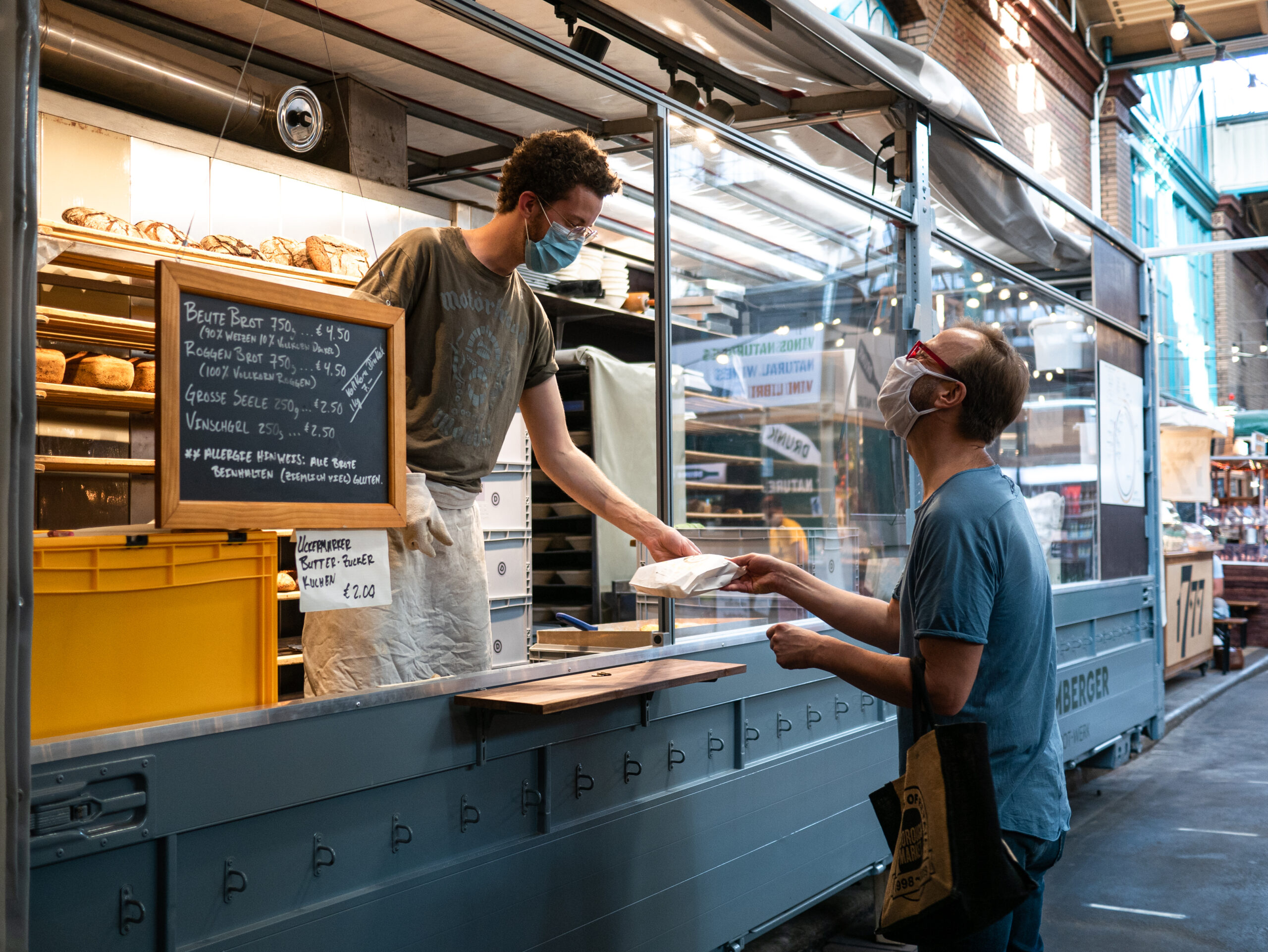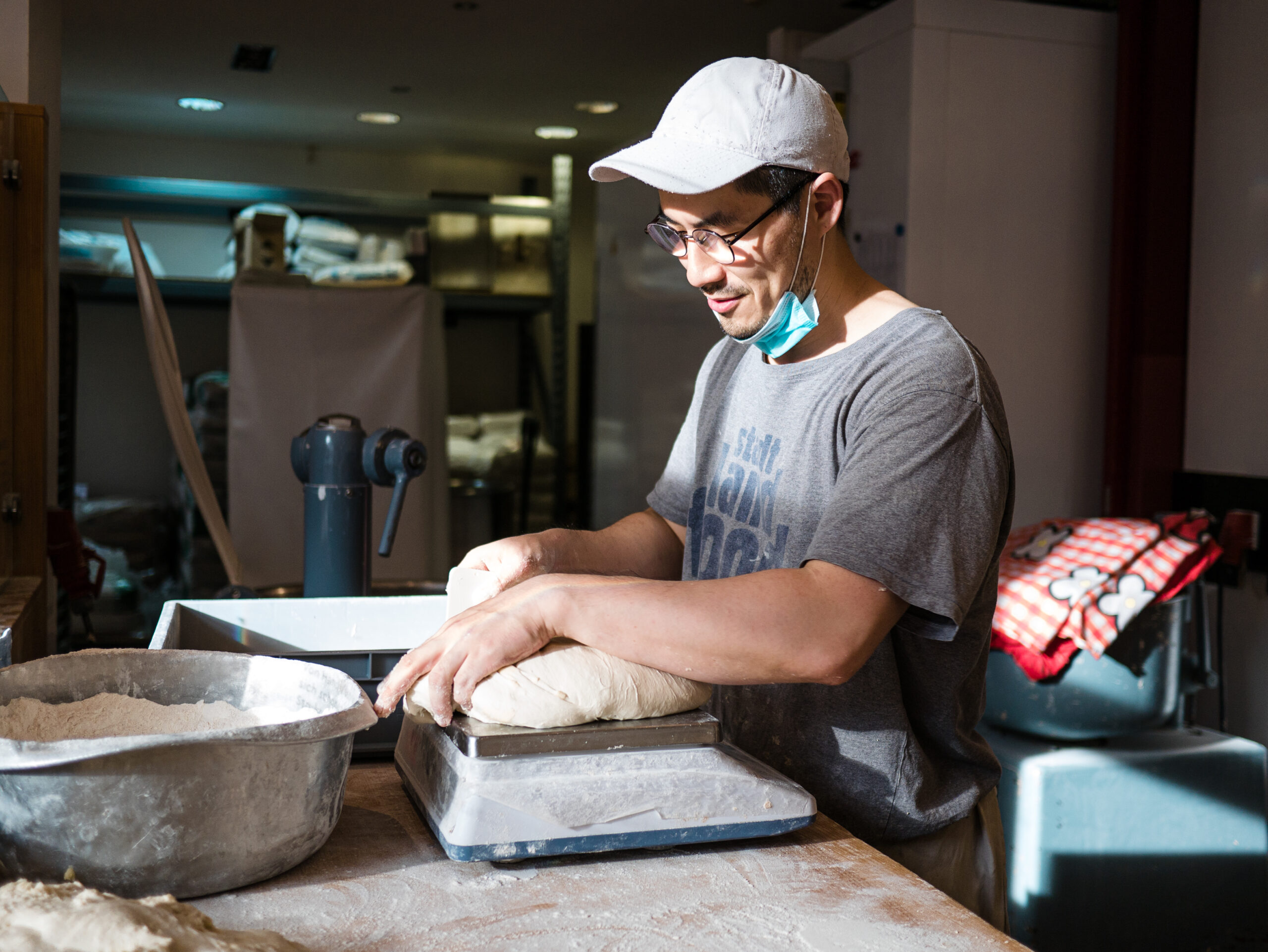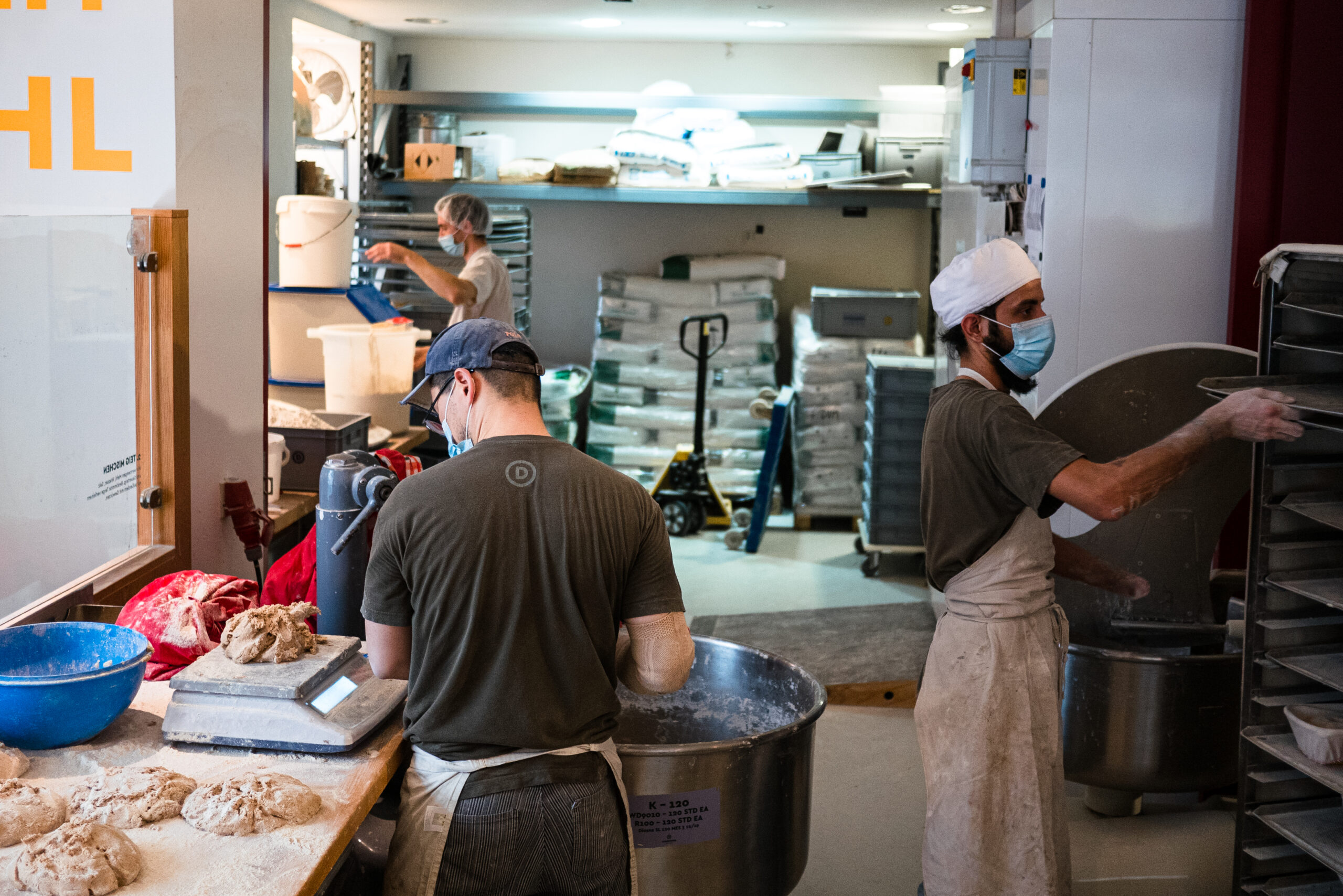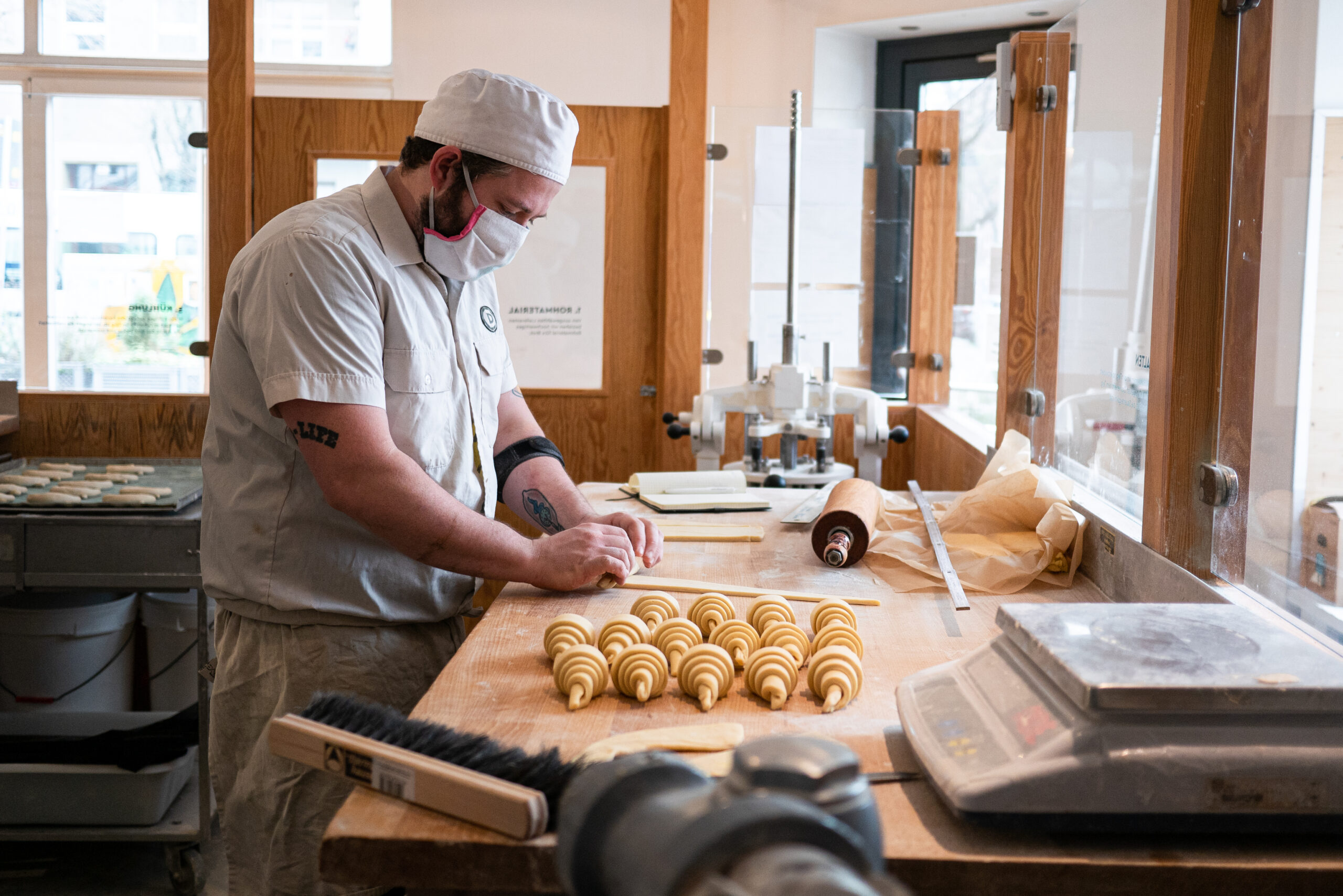Domberger Brot-Werk
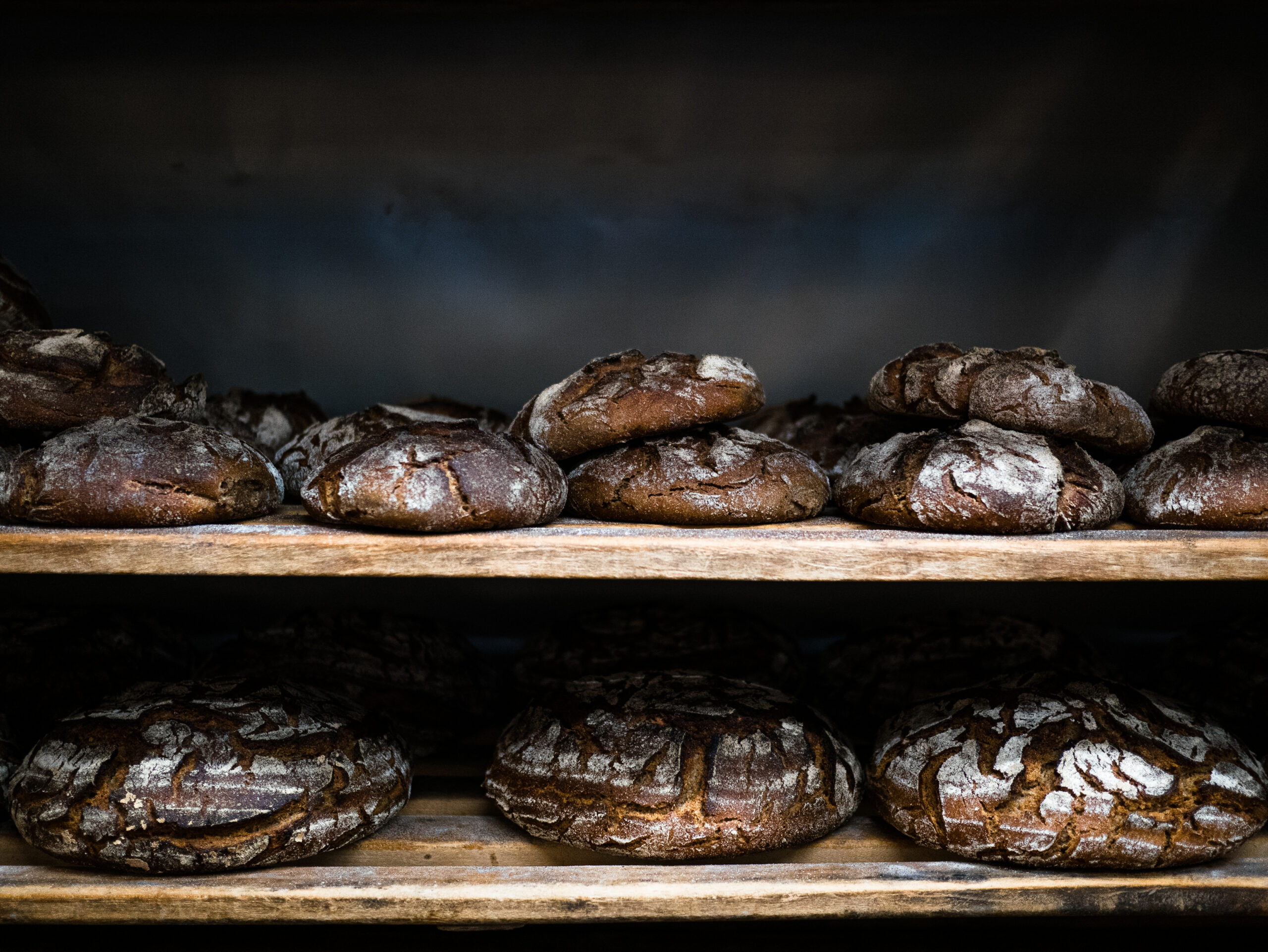
How can a modern education for career changers in the food crafts look like? A conversation with Florian Domberger, founder of Domberger Brot-Werk in Berlin, about how to transfer knowledge, transparency in the company and whether baking makes people happy.
What is the significance of the traditional baker’s craft in today’s world?
In Germany it is a disaster. For us, that’s excellent, because it allows us to occupy our niche. But the fact is that the much-praised German baking trade no longer exists. Björn Wiese always says that of the 11,000 bakeries in Germany, maybe 20 still bake the way we do – that is, only with flour, water, salt, nothing else. So what status does the craft have? De facto, it no longer has any.
How did you get into baking, can you briefly explain your path?
I trained as a forwarding agent, worked in the German army and then studied transport management, which is practically transport. I then spent some time abroad, in Hong Kong, Indonesia and Australia – in Australia I decided to start my own business as a baker, but it didn’t work out. So we went back to Europe as a family. After working in purchasing for other large companies, I founded Domberger Brot-Werk in 2015. To learn how to bake, I did an internship with Björn Wiese, and in October 2016 I opened my own bakery in Berlin-Moabit. In the last few years, I have added three more small bakeries on trailers and in containers, the Bread Bridges.
Was it always your wish to work in the crafts one day?
I am good at the craft, but actually the craft is not what I want to do. I learnt the bakery trade so that I could do it one hundred percent and understand it. My real profession is trainer. I train people, guide them, run the whole business. And I make sure the quality is consistently high and make sure we have an audience. I do the role of trainer with an absolute passion. For me, it means that I trust the person, that there is already something in him*her that we can use in ours – which in turn helps people to grasp their profession more quickly and to consolidate in it.
Why did you decide to set up your own bakery business?
I have three passions – bread, beer and trucks. Bread is where I saw the least economic risk.
When it comes to training and further education, you take unusual approaches in your company. How do you impart the necessary knowledge to your employees, many of whom are career changers?
We get one or two applications every day from people who really have something on their minds, who could actually do something else. But they want to leave their old job behind and work here. That makes me very happy, because it shows that I intuitively did a lot of things right. We have made people want to come to us by letting them work with us from day one. From the first day on, you work on the dough. From day one you develop a feeling for the dough. From day one you are completely challenged. We don’t give our bakers a chance to escape.
Does baking make you happy?
It’s one of the coolest jobs you can have, just from a craft point of view. It’s just like that. You have something in your hand that you can feel. And a day later you have a result that you can sell. How cool is that, that’s great! Instant feedback and customers you can make happy. You can also earn money with it and pass it on to the kids. It goes through the stomach. It makes you happy. And that’s what you have to manage to get across to people. And if I just let first-year apprentices clean trays, how are they supposed to get into the bakery trade? What we practice here is called competence-oriented learning.
Do you have trainees in the classical sense who still must go to school?
Nah. These are all people who just want to work, who want to do something and who learn by just doing it. If you have a motivation to learn the baking trade, but maybe you’ve already worked in another profession for ten years – should I send you to vocational school again? I would be ashamed because that is wasted time. We don’t do that, from the first minute you are paid with us, based on your skills. When you consolidate your knowledge, you are graded further.
And payment is transparent for everyone in the bakery?
Yes, everyone here knows what the others earn because the system of skill levels is open. So, everyone has a motivation to climb to the next level, from baker one to baker two, three, four. At level four, you can run the entire bakery.
Were there any role models in the development of this model, were you able to pick up things from other areas?
We couldn’t rely on the training plans from the traditional bakery trade, because they are lousy. So we wrote and developed them all ourselves. I steal a lot of things from the leadership and training curriculum from the German Armed Forces. And as far as logistics and the commercial parts are concerned, I learned all that myself, so that’s no problem either. Our master baker Ralf is now also taking on more and more of the role of trainer – so he gets a second opinion, which I think is good.
What plans do you have for your bakery?
I have noticed that there is one thing that I find really ingenious. And that is this living small. That means setting up small bakeries and helping people to take responsibility to become self-employed at a later stage. I feel very comfortable with the idea of expanding the bread bridges more and more and setting up containers all over Berlin where small teams work – which ultimately all work together in the Domberger Brot-Werk company. But all under the premise of decentralized, that means baking bread locally from flour, water, salt and sourdough. Others can produce centrally and then deliver. I want to train people and then give them responsibility. That is a medium-term goal. In the long term, I would like to hand over bread baking completely to my people and set up two other companies. A logistics company, whose lines the bread bridges can then access, and a training company. This is where the community comes in.
“We have managed to make people want to come to us by letting them really work with us from day one. From day one, you work the dough. From day one, you develop a feeling for the dough. From day one you are completely challenged. We don’t give our bakers a chance to escape.“
Good segue. Because I wanted to ask you next why you became a member of the community and what your place is there.
I believe that I am quite good as a business person and that I can teach people how to run a business successfully. In the community I see three roles for me – as a business management trainer, as a trainer for trainers and as a trainer for logistics. These are things I can teach, also within the community. I want to work with the community on our own model of how we can teach methodologies and content. How can we transfer what we do at Domberger Brot-Werk to other areas, to the cheese, brewing, butchery, wine-making trades and so on.
In your opinion, how can we generally strengthen the cooperation between the individual areas of food trade – gastronomy – agriculture?
Simply put, there is a very simple method. And that is to do business together. Developing common goals and working towards them. Let’s say everyone supplies the same market – then everyone has an interest in that market being successful. The second point is to find common interests and pursue them together, for example in the areas of training and logistics. To develop a working model and use that. By using it, I start collaborating with each other, automatically.
What do you see as the most important points in the food system that need to change?
As a businessman, I take a very monetary perspective on this, so I would describe it as everyone having to start internalizing their externalized costs. This has a lot to do with the topic of sustainability and is very central for me. Mankind is making such a mess of this planet, partly because we don’t think about the actual costs we are causing. For example, diesel is 12 to 16 cents more expensive – hurra, at last we are paying a little more for the increased CO2 emissions. But that must happen for conventionally produced clothing just as it does for conventionally produced food.
Who do you see as responsible for implementing these changes?
Everyone should live their own little communism. That is, the behavior of everyone should be able to guide the social behavior of others. I think the categorical imperative is an incredibly healthy principle.
And you must influence each other. For us bakers, the best way is to stand in the shop and talk to the customers.
Photos
Marianne Renella, Jörg Lehmann
